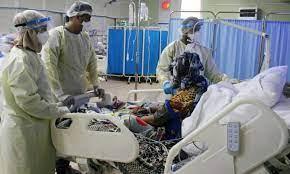Yemen: 15,000 children at immediate risk, critical child protection services under threat


“I saw my children screaming, crying and bleeding. I felt dizzy, I lost consciousness. Doctors were trying to help me. I did not know out of my children who was injured and who had been killed,” Ali*, father of Yasmeen* (pictured above)
Children in Yemen live in constant fear. Every day they risk being killed or injured in hostilities or by unexploded bombs.
The very places children should feel safe – schools, markets and hospitals – are being targeted. Many have lost loved ones or been separated from their families. Child rights violations are endemic as a result of the conflict. 1 in 4 civilian casualties are children and more than 13,000 grave violations against children have been reported since the escalation of the conflict in 2015.
The impact of the conflict on children’s mental health and wellbeing is profound. Based on a Save the Children survey
of 1,250 children, parents and other caregivers conducted in 2020:
Prolonged exposure to extreme stress risks undermining the developmental potential of an entire generation of children and adolescents.
However, if the right mental health and psychosocial support is provided, the long-term impact on children's emotional, behavioural, cognitive and physical development can be mitigated and they stand a chance to recover from their experiences.
Similarly, our case management services provide a critical mechanism through which children are able to access the critical child protection services they desperately need. In 2020 alone, we provided case management support to 316 survivors of grave violations.
Without an urgent increase in funding in the next two months, we're in real danger of having to close case management, mental health and psychosocial support, and child protection services in some of areas where the needs are greatest. This risks putting 15,400 children at immediate risk of not being able to access critical child protection services. Massive gaps for child protection have already seen Save the Children’s case management reduce by almost 50% to $2.5 million, down from $4.6 million in 2020.
This will mean that we are not able to reach children like 6-year-old Yasmeen*, who had shrapnel lodged in her body and head when a shell hit their Taiz home in November 2020. Yasmeen’s 11-year-old brother was killed in the incident.
*“The majority of victims in Taiz are civilians, including innocent children and women, especially those young ones in schools or fetching water,” says *Ali.
It is fundamentally wrong that the UK government is cutting aid to Yemen at a time when humanitarian needs are increasing and life-saving services are already being cut back. Even before the UK announced its brutal 60% cut to Yemen, we had to withdraw our support from 41 health facilities due to defunding. This resulted in a 27% drop in people receiving acute malnutrition treatment between January and September 2020 compared with the same period in 2019, just as Yemen stands on the cusp of famine. This year, we're facing a further potential closure of 13 health facilities due to funding gaps.
We are currently providing ongoing medical support so Yasmeen* can have surgery to recover from her injuries. She is recovering well from her first surgery, and enjoys playing with her younger sister Safa’a* who is two. When Yasmeen is well enough, she will need a second operation to replace sections of her skull.
The UK must pledge more funding if children like Yasmeen are going to continue to receive life-saving care, if famine is going to be averted, and if child protection programmes are going to be able to continue for some of the most vulnerable children.

Paris — The French humanitarian organization Acted announced that it has delivered cash assistance to nearly 89,000 people affected by displa…

Sana’a — Fuel and food imports into ports under the control of Yemen’s Houthi movement on the Red Sea have continued to fall for…

ADEN — Yemen Airways, the country’s national carrier, announced it will resume flights between Aden and Abu Dhabi beginning in January…